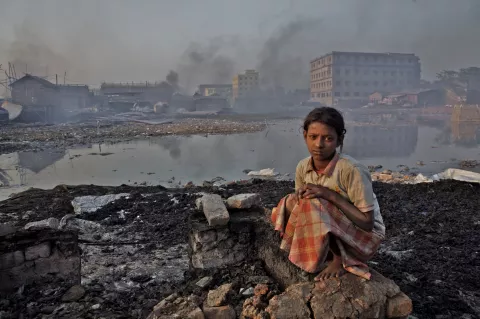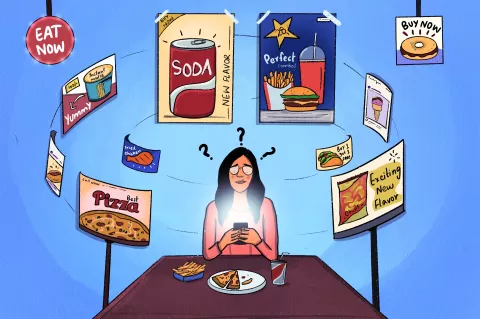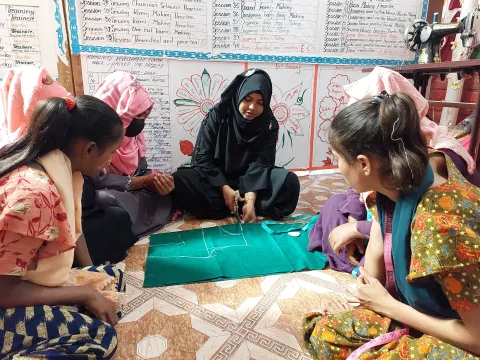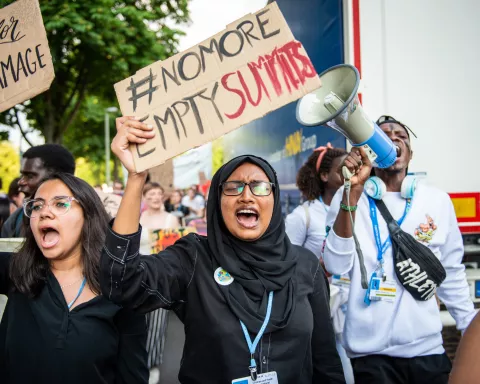“Nights are spent lying awake…dreading the arriving morning. I continue through the day, doing things I am supposed to but I’m not sure if the struggle is worth it in the end?”
I’ve heard variations of these words from friends over the last few years.
Hopelessness, defeat, loneliness, disinterest, tiredness, anxiety; they've been unfortunate companions for young people like us.
And from what I’ve read and seen, young people everywhere seem to be feeling the impacts. In a recent UNICEF and Gallup survey of 21 countries, roughly 1 in 5 young people aged 15-24, said they often feel depressed or have little interest in doing things.
What is stressing young people?
Young people are living through one of the biggest transformations of all times — the rapid digitization of society. It’s a mass experiment about which we don’t yet fully understand the benefits and consequences.
The omnipresence of technology is constantly opening incredible opportunities for communication, information access, and convenience. But this constant connectivity comes at a cost, and many young people are being exposed to it. Here’s just some of the digital “stressors” that are affecting young people’s mental well-being:
It feels like everyone’s watching - Your mistakes and learning no longer take place in isolation, but in front of the whole world. Everything you post, say, comment, or react to leaves a digital footprint that will forever exist online.
You’re always online and connected - You now need to have a curated digital presence and feel pressure to be available and responsive 24/7. Close friends have often confided how even on their lowest days, they’ve felt like they needed to appear energetic online.
There’s an onslaught of messages and notifications - We’re stuck in a stream of continuous notifications, messages and a never-ending loop of videos and refreshing newsfeeds - all of which causes stress and anxiety.
Online life feels like it matters more - It feels like virtual presentation counts more than the real world. For example, after a long day of community service, like organising a cleanliness drive, it’s crushing to see the success of the event gauged by comments and interactions online, rather than real world impact.
And perhaps most damaging — the digital world can foster a culture of comparison, where we’re constantly measuring ourselves against the carefully crafted images of others.
Many young people like me feel this constant comparison eroding our self-esteem and contributing to feelings of inadequacy and insecurity. The aesthetic routines and picture perfect lives we see on screen define a standard of being, which warps our world-view. We’re left chasing a ‘perfect’ way of life, which changes with every new trend.
When you are brave enough to share your struggles, you’re at the mercy of online commenters, who can be so cruel — especially to girls.
What's worse is anytime we raise our voices and plead for change, we’re met with a lack of action, greenwashing campaigns and sometimes even ridicule.
I often see adults rationalising what we feel. I’ve heard variations of these words too:
"Be strong. Cheer up, it’s not the end of the world…. everyone feels this way, it’s part of growing up."
But it’s not, is it? Especially, right at this moment.
And this isn't the only challenge we are facing. The compounding effects of the COVID-19 pandemic, the climate crisis, natural disasters, wars and economic downturns upended our lives. All these life altering events happened or intensified in just three years!
We are on the verge of losing the smiles of an entire generation to fear, hate and frustration.
It’s clear we have a big problem.
What can decision-makers do?
Young people are overwhelmed and we need the support of decision-makers and governments.
Firstly we need laws and regulations that make reporting hate, scams and online abuse accessible and easy. Likewise, we need regulations and experts’ support to make the online world a healthier, less demanding and less toxic place to be.
Secondly, young people have different perspectives, because we have grown up in a world so different from the worlds that have shaped previous generations. We want to be involved, heard and actively partner to build a liveable future that helps us reach our full potential.
We need those in power to create spaces for young people in decision-making processes that enable us to contribute to policies and initiatives that directly impact our lives and the future of the planet.
This can help us feel more in control of our own lives and futures and feel like our biggest concerns are being addressed.
Lastly, every child, young person and their families need support they can turn to to help them with their mental health.
In South Asia, mental health remains a taboo and lacks investment and support services.
Before COVID-19, a study published in the Indian Journal of Psychiatry (2019) estimated that at least 50 million children and adolescents in my country, India, are affected by mental health issues. Between 80 and 90% of them never seek treatment.
We are living in unprecedented times. We need unprecedented mental health support and services.
This is not a battle of generations, but a cry to save the minds and lives of young people in our new world.

What can parents do?
Dear parents, listen to us and hear what we want to say.
We know life is very different from when you were growing up. You faced your unique challenges and you overcame them. We now need you to listen to us and help us through the challenges we are facing.
Little steps in acknowledging the struggles of these times can mean so much.
Share your own struggles with us too. When I was struggling on a particularly stressful day, my father sharing his own story was the only thing that kept me going.
I’ve spoken to many friends battling with struggles who have often wished that their parents could talk with them.
What can young people do?
To all the young people out there who are struggling, I stand with you. If there are people in your life who you trust and can talk to, please do so. Things can get better.
Here’s some of the things that have helped me when I’ve felt overwhelmed:
- Taking a break from digital devices.
- Being mindful of what I’m signing up for, every time I think about pressing like, subscribe or follow. Following loads of pages and personalities can be overwhelming and lead to much more mindless consumption of content. Being more selective. Think about the content and creators that add value and positivity to your day.
- Noticing when I feel information overload and going back to pen and paper, to help focus away from the whirlwind of ideas and facts on my screen.
- Writing down reflections about how I’m feeling.
Remember - all is not lost. And we, the young generation, are not ready to give up!

Aditi Sahi is a twenty-one-year-old student and creator from India. She talks about common problems she saw growing up through art like illustration and animation.
An economics grad, she is currently pursuing an MBA at IIM Kozhikode and juggling assignments with content creation.
An advocate for youth, sustainability and mental health through her art, she believes in the power of stories to change the world.





